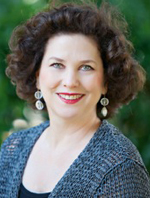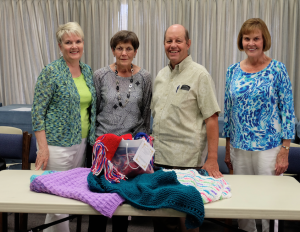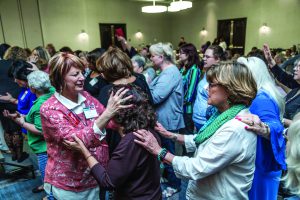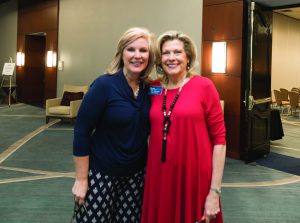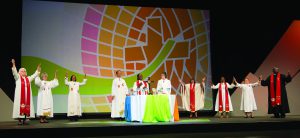
Bishops preside over a service of Holy Communion during closing worship at the United Methodist Women Assembly 2018 in Columbus, Ohio. Photo by Mike DuBose, UMNS.
By Katy Kiser –
In 1973, Response magazine, the official publication for the United Methodist Women (UMW), claimed the organization had 1.5 million members. Since that time, membership in UMW has declined at an alarming rate.
In 2012, the Women’s Division was granted independence from the General Board of Global Mission – and became the United Methodist Women National Office. The staff hoped their independence would bring new vitality and influence, but the organization has failed to curb its staggering membership loss.
Currently, less than half of the nearly 32,000 United Methodist congregations in the United States have a UMW unit. (It should be noted that UMW identity carries a different sense of spirituality and fellowship outside the U.S.). Institutionally, UMW is losing members at five times the rate that the general church is losing female members. According to official GCFA numbers at the end of 2016, membership in UMW was only 438,543. The decline from 1.5 million to less than 450,000 is drastic. The signs are not looking promising. Within the last 10 years, UWM lost more than 200,000 members — nearly one-third of its membership.
What has contributed to this precipitous membership loss? Like the general church, it can be partially attributed to the death of its aging membership, which is not being replaced. But this is not the primary reason.
As Team Leader of Renew Network, the women’s arm of Good News, I get a steady stream of calls from women who voice concerns for the partisan politics, missiology, and theology coming out of the UMW National Office. It is in their voices that I find compelling reasons why eight out of every nine women in the United Methodist Church do not belong to or support the UMW.
It’s all Partisan Politics
“Can you help our United Methodist Women?” asked the woman on the phone when she called our office. “We don’t want politics. We want Bible study!”
By far the question most asked of Renew is, “What can you tell me about the politics of the UMW? The women of my church want to know.” These requests represent a concern that the leadership is predominately involved in community organizing, activism, and lobbying for specific left-leaning political outcomes.
The perception that UMW is political is supported by the United Methodist Women’s lobbying presence on Capitol Hill, which is run out of the UMW National Policy Office in D.C. as well as at the United Nations where they have consultative status. Women are invited to participate in political action through a number of venues.
On its website, it maintains a list of Action Alerts (currently 40+). These alerts give everything women need to call or write Washington and add their voices to support or defeat the positions that the National Office recommends. Rarely do these Alerts reflect the concerns or positions of moderate or conservative women. It disturbs these women when they hear the UMW staff claim to represent all women in the United Methodist Church.
The UMW National Office also sponsors Annual Social Action or Legislative Events in various states where women can gather to influence state policies as they relate to the justice priorities of UMW. This year, at the UMW 30th Annual Legislative Event in Austin Texas, the women partnered with Texas Impact, a progressive advocacy group. The UMW rarely if ever advocates for politically moderate or conservative public policy solutions.
The UMW National Office utilizes “Mission U” held in every conference each summer and a quadrennial national gathering know as “Assembly” to organize the women for action. At the May Assembly, women were organized to embrace their power to change our economy, our climate, women’s health, and the incarceration rate. The event held 54 workshops led by social activists – two of whom were co-chair persons for the 2017 Women’s March held the day after the inauguration – including the exceedingly controversial Linda Sarsour, a provocative Muslim-American activist.
Over the years, UMW’s political activism has been rooted in an unbalanced and strongly progressive perspective. Without fail, it advocates for public policies that call upon big government solutions to social inequality. Rarely do they consider unintended consequences or the possibility that government intervention can hurt instead of help. Social inequality has widened as the traditional family has weakened. But strengthening the traditional family is not a justice priority of UMW.
Becoming informed and participating in the political process is not at issue, nor is the importance of the church’s social witness. But when the work of the UMW clearly promotes policies that favor the legislative proposals of one party over the other, it leaves them open to the charge they are both political and partisan.
Partisan politics is not a recipe for growth. Nor is it a recipe for making disciples for Jesus Christ.
What is Mission?
The emphasis on activism and community organizing begs the question, “What is Mission to the United Methodist Women?” In a 2017 summer newsletter, Harriet Olson asked a similar question. She quoted an orthodox theologian saying, “Mission is following the Holy Trinity into the World.” She went on to say, “We hear and respond to the cries of the needy… and we root ourselves in the core of the message: to ‘love God with all your heart, soul, mind, and strength’ through faith in Christ and to ‘love our neighbors as ourselves.” Wonderful words indeed.
But it is not in these words that women question the motives or the mission of UMW; it is in the actions they take that women have asked, “Has the mission of UMW become a mere political vision for social justice as defined by progressive politics and in so doing neglected, if not lost, the gospel altogether?”
Is it possible to bring about the Kingdom of God by changing our social systems? The UMW National Office appears to believe it is. Why else would they put so much emphasis on one-sided partisan responses to all the controversial issues facing the United States? Politics, politics, politics.
At the 2012 and 2016 General Conferences, an individual submitted legislation to amend the Responsibilities of United Methodist Women in paragraph 1320 of the Book of Discipline to include the statement, “Encourage United Methodist Women in efforts to bring the good news of Jesus Christ to their local communities.” This petition would have required the incorporation of evangelism, central to the mission of the church. The UMW did not support the petition; it failed.
The UMW were not successful in their effort to stop a petition and a resolution to recognize and encourage women’s and men’s ministry independent of UMW and UMM. But they did insert the phrase “justice advocacy” into the resolution, signaling its continued commitment to their particular vision of progressive social justice.
Many women who believe Christ alone is unique and holds the keys to salvation and transformation of the soul realize the gospel has been sidelined. In its place, transformation of our “systems” and achieving human so-called justice based on material equality has become a substitute for the cosmic changing work of Christ on the cross.
This point should be remembered when we hear some bishops claim that all Methodists can agree to lay aside theological differences and organize around shared mission. The issues that divide us politically, also divide us theologically and lead us to different understandings of mission. The “social holiness” of John Wesley was a concept based on discipleship – not the partisan brand of “social justice” promoted by the UMW.
Radical Feminism and Other Theological Concerns
Theological concerns have also played a major role in the decline of United Methodist Women. In 2016, UMW Spiritual Life Study, The Bible and Human Sexuality came out; it was a focus at Mission U (what used to be known as the UMW School of Christian Mission). A female clergy friend and I decided to attend; we had read the book and had serious concerns. The author had reinterpreted scripture to justify a new understanding of biblical morality. We were hoping that Mission U, which reaches thousands of women each summer in each annual conference, would be more balanced than we had found the book.
Our hopes were not realized. An entire Saturday was spent deconstructing biblical teaching on sexuality and revising it to promote a new sexual ethic. This book turned the Bible’s teaching on sex before marriage, adultery, and marriage upside down. It undercut the Bible’s dichotomy between sin and righteousness by calling into question time-honored understanding of Scripture. Much of the revisionist questioning came out of the author’s claim that the Old and New Testaments were written in a time of male dominated society (patriarchy) and thus many of the injunctions of scripture are not applicable.
The participants were asked to accept not only the practice of homosexuality, but also a sexual ethic that would eliminate any scriptural boundaries on sexual practice other than “consent and safety.” We were asked to categorize our sexual experiences as positive or negative. We were told that the church needed to discard the marriage culture, because it condones harmful behaviors as long as they are within marriage and says nothing to singles, widows, and homosexuals.
To reinforce these points, we were shown a short film where Barbara Lee, a Christian feminist said, “To relate to each other as whole human beings, we need to develop and live by a Sexual Ethic that celebrates sex while treating it with moral integrity. An ethic that begins by recognizing that people of all sexual orientation and gender identities, of all marital status, and of all physical capacities, have the right to experience sex as a healthy and life-giving part of their existence.”
Sex was being taught not as a covenant between a man and a woman ordained by God, but as a “right” because it was God’s good gift, healthy and pleasurable.
In the early 1990s, the then Women’s Division was a major participant in the Re-Imagining Conference, which was initiated by the World Council of Churches and billed as a theological conference for feminist, womanist, and lesbian ideology. The conference created quite a stir in United Methodism.
The radical feminism and goddess worship that permeated the conference has not gone away in the decades since. In fact, the Sophia worship of the Re-Imagining Conference resurfaced in the 2017 UMW spiritual growth study titled, If Eve Only Knew: Freeing Yourself from Biblical Womanhood and Becoming All God Means for You to Be. The authors reinterpreted scripture beginning with the creation story where they reframe “Eve as a wise woman, the serpent as an agent of transformation, and the garden as a symbol of innocence that must be left behind to experience the complex fullness of life.”
The authors see the Bible as a “call of liberation.” They portray the Holy Spirit not as the Spirit Jesus describes in John 14, but as one that brings new revelation as society evolves. They see biblical teaching on sexual morality and purity as fear-based ideas that young women should reject. The authors believe the lack of feminine language for God promotes sexism. They encourage women to name God for themselves, because seeing God as “He” keeps the oppressive patriarchal systems in place.
Is it any wonder that some women have left their UMW units over serious theological concerns?
Good News for Women’s Ministry
At the same time that UMW has been declining, Christ-centered, biblically based, spirit empowered women’s ministry and mission has been thriving. This fact was recognized at the 2016 General Conference when paragraph 256 in the Book of Discipline was amended to officially allow and encourage women’s ministry alternatives to UMW. This addition to the Discipline has given women in the local church the freedom to expand their ministries in hopes of not only growing membership, but also with the goal of growing in Christ and offering him to a hurting and confused world.
Although the staff of the UMW National Office continues to claim that UMW is the only official women’s ministry in the church, this simply is not true. Women’s ministry in the church is not limited to UMW. Many women in the local church have recognized that unless we ourselves are transformed by and have a deep relationship with Christ, we cannot hope to further the mission to make disciples and transform the world. We cannot share what we do not have. The world does not need more of the world and its secular agendas. The world needs the transforming power of our Savior.
It was the power of Jesus Christ that inspired the women in Women’s Society of Christian Service and Women’s Foreign Missionary Society of the Methodist Episcopal Church both of which originated in the late 1800s. The torch that carried the light of Christ into the world by the courageous women of the predecessor organizations has been preserved in the work of any number of Methodist women in the church today.
These fore-mothers are claimed by UMW who trace their origin back to these early groups. But if these inspiring women were with us today, they would have much in common with the women’s groups who operate outside UMW. They too would most likely be concerned by the politicization of mission and revisionist interpretations of Scripture. Thankfully, new evangelical Wesleyan women’s voices have emerged within the United Methodist Church. Women who do not belong to UMW are attending various Bible studies, ministry programs, prayer groups where spiritual formation is faithful to Scripture. They participate in both local and global mission opportunities which take seriously the Great Commission that Jesus gave his disciples and subsequent generations.
With the new legislation passed at General Conference 2016, the future for women is bright despite the decline of United Methodist Women.






